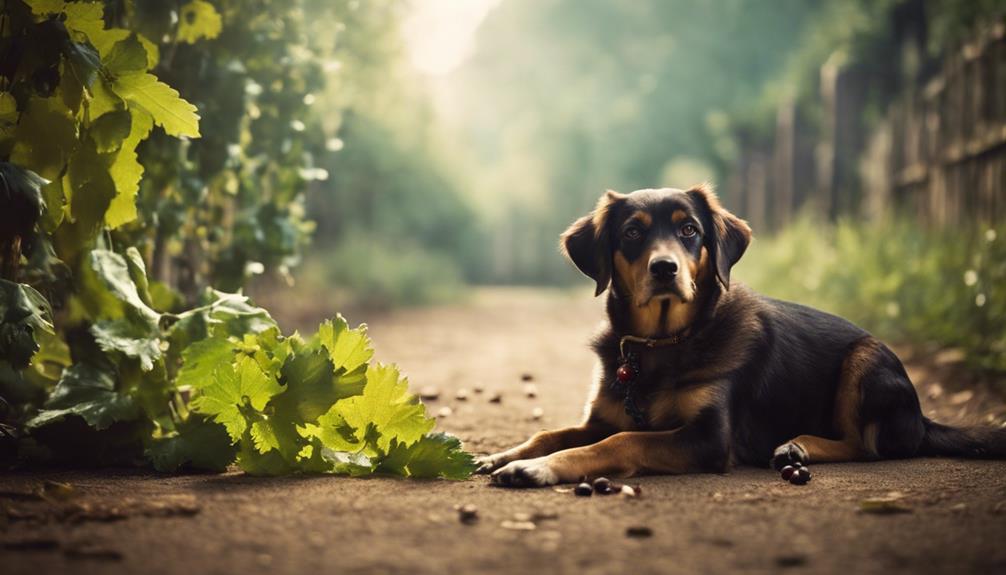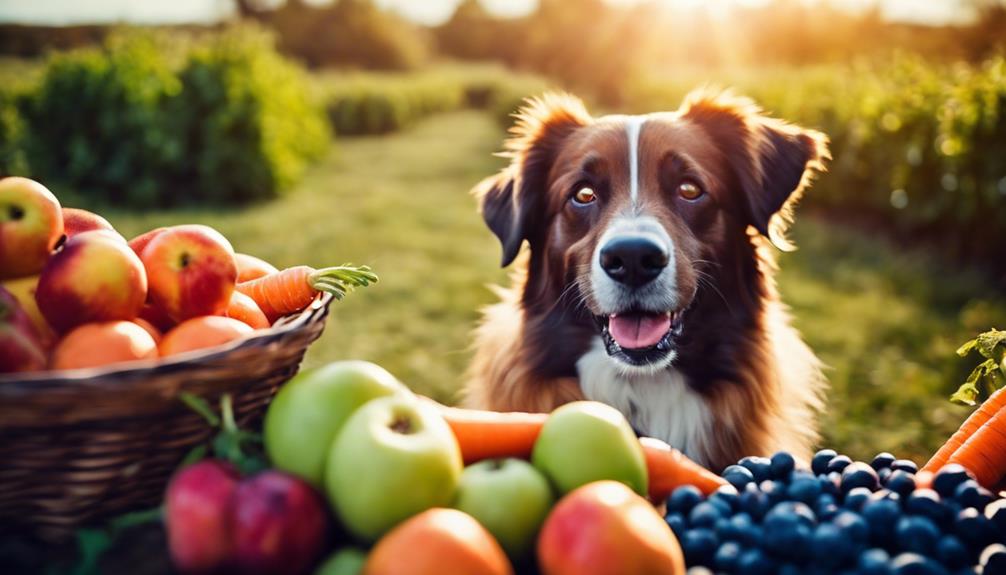Dog Gooseberries: Safe Fruit Consumption
Gooseberries might seem like a tasty treat for your pup, but dogs should avoid these fruits. They contain glyoxylic acid, which can lead to kidney stones and damage, similar to the risks associated with grapes. It’s vital to recognize any signs of trouble early if your dog does eat gooseberries.
Symptoms to watch for include upset stomach, acting out of the ordinary, and, in severe cases, signs of poisoning. If you notice any of these issues, contacting a vet immediately is crucial.
To keep your dog healthy, knowing what they can and can’t eat and choosing safe snacks is essential.
Key Takeaways
- Gooseberries can harm dogs, causing kidney issues.
- Vomiting and lethargy signal gooseberry poisoning in pets.
- Choose safer fruits like apples for dogs.
Gooseberry Toxicity in Dogs
Gooseberries contain glyoxylic acid, making them harmful to dogs. This substance can cause health issues like kidney stones, affecting dogs whether the berries are ripe or not. These fruits are related to grapes, which are also dangerous to dogs. The presence of glyoxylic acid highlights the risk they pose.
Pet owners must know the dangers of feeding their dogs gooseberries. Preventing access to these fruits can help avoid serious health problems.
Recognizing Symptoms

Understanding the symptoms of gooseberry ingestion in dogs is critical to their well-being. This knowledge helps you quickly spot allergic reactions, signs of gastrointestinal upset, and unusual behaviors that may suggest poisoning. Quick recognition of these symptoms is crucial for the health of dogs that might have eaten gooseberries, ensuring they get the veterinary care they need without delay.
When a dog eats gooseberries, watch for any allergic responses. These can include skin rashes or swelling. Another concern is gastrointestinal distress, which manifests as vomiting or diarrhea. Also, watch for changes in your dog’s behavior, such as increased lethargy or agitation, which could indicate toxicity.
Acting quickly can make a big difference in your dog’s recovery. If you notice any of these symptoms, it’s essential to contact your vet right away. Early intervention can prevent more severe health issues and help your dog get back to feeling their best.
Identifying Allergic Reactions
Knowing when your dog is having an allergic reaction to gooseberries is crucial. Symptoms like itching, swelling, or hives are clear signs. If your pet eats gooseberries and then throws up or has diarrhea, it’s likely a reaction to the fruit. These symptoms show how their body fights off what it sees as harmful.
In worse cases, dogs might have trouble breathing or even experience anaphylaxis. This is very serious and needs quick action from a vet. So, spotting these signs and getting professional help is vital to keeping your dog safe. Keeping an eye out for allergies and not giving your dog gooseberries can help avoid these dangers. Making intelligent choices about your dog’s diet is a big part of keeping them healthy and happy.
Gastrointestinal Issues Signs
When your dog eats gooseberries, watch closely for signs of stomach trouble. Eating these fruits can sometimes upset a dog’s digestive system, leading to symptoms like vomiting and diarrhea. These reactions are vital to notice because they can signal more serious health issues.
Vomiting is a direct sign your dog’s stomach is upset. Diarrhea shows there’s irritation in the digestive tract. If your dog also indicates a lack of energy or avoids eating and drinking, these could be signs of a bigger problem with their gastrointestinal health. Look out for pale gums and red spots in their mouth, which could indicate irritation or damage inside.
These symptoms are your dog’s way of telling you something’s wrong and shouldn’t be ignored. Getting in touch with a vet quickly can make a big difference in addressing your pet’s digestive issues.
Behavioral Changes Monitoring
Keeping an eye on your dog’s behavior after they eat gooseberries is crucial. This helps in spotting any health concerns early on. If your dog starts showing signs like laziness, avoiding meals, or having pale gums, these could be warning signals. They might mean more than just a stomach ache.
Watch out for red spots in their mouth or any new, odd behaviors. These may point to allergies or irritation from the fruit. Symptoms such as vomiting and diarrhea are clear signs of stomach problems. If you notice any of these issues, contacting your vet immediately is critical. Taking action quickly is the best way to ensure your dog stays healthy and avoids serious problems after eating gooseberries.
Immediate Response Steps

If a dog eats gooseberries, check their condition for signs like vomiting or drooling immediately. Then, contact a vet quickly to ensure the dog gets checked out and treated if needed. This is key to avoiding any severe health problems and keeping the dog safe.
Assessing Dogs Condition
After a dog eats gooseberries, it’s crucial to quickly check their health for signs of trouble, such as throwing up, diarrhea, and tiredness. This is because gooseberries, especially when not fully ripe, can cause problems that might need a vet’s attention.
Watch for symptoms like vomiting, diarrhea, being less active, and not wanting to eat or drink. These are clear signs your dog isn’t feeling well. Examine their mouth for any pale gums or red spots, which could mean an internal issue.
Keeping them hydrated is critical. Offer them water, ice chips, Pedialyte, or broth to help prevent dehydration. If your dog feels nauseous, giving them Pepcid AC/famotidine, but only with a vet’s approval, can help control vomiting.
Contacting Veterinary Help
If your dog eats gooseberries, immediately call a vet for advice. Gooseberries might harm your dog’s kidneys because they contain substances that could be toxic, especially when not fully ripe. Reach out to your vet right away. If they’re unavailable, find a pet poison hotline to get help.
Be ready to tell them how much your dog ate and when it happened. This information helps them figure out how serious the situation is and what to do next. Following the vet’s urgent advice can help keep your dog safe after eating gooseberries.
Veterinary Interventions

When your dog eats gooseberries and starts showing symptoms like throwing up, having diarrhea, or acting unusually tired, it’s crucial to get them to a vet quickly to avoid serious health problems. Vets have a detailed plan to treat these symptoms and prevent issues that could arise from eating gooseberries.
- Immediate veterinary care is critical. A vet might need to make your dog vomit in a safe way to stop more toxins from getting absorbed.
- They will also give medications to help with symptoms like nausea and diarrhea and to safeguard the dog’s digestive system.
- The vet will run blood tests and other necessary checks to understand how the gooseberries have affected your dog.
- Keeping an eye on your dog’s recovery through regular vet visits is critical. This ensures they return to health and any ongoing issues can be dealt with effectively.
Taking these steps seriously helps ensure your dog stays healthy after an incident with gooseberries.
Gooseberry Plant Dangers

It’s vital to protect your dog from the dangers of gooseberry plants. These plants have harmful substances like glyoxylic acid, which are dangerous for dogs if eaten. Every part of the plant can harm your pet, from its seeds and leaves to the flowers. It’s best not to let your dog eat any part of a gooseberry plant.
Eating gooseberry plants can cause severe stomach problems or even toxic reactions in dogs. This is why watching your pet near these plants is so important. Ensuring your dog’s safety involves being cautious and preventing them from eating these plants.
Prevention Strategies

To keep dogs safe from the risks that gooseberry plants might pose, it’s essential to put in place some preventive measures. If dogs get into gooseberries, they could have stomach issues or even more severe health problems. As pet owners, ensuring our gardens are safe for our dogs is a top priority.
Effective ways to prevent dogs from getting to gooseberry plants include:
- Building fences around the plants so dogs can’t reach them.
- Gooseberry plants should be placed in raised beds or containers, so they’re too high for dogs to access.
- Make sure to pick up any gooseberries that fall to the ground to avoid dogs eating them by mistake.
- Teaching your dog commands like ‘leave it’ to keep them away from gooseberries.
Getting everyone in the family involved in these steps helps make sure your dog stays safe and healthy.
Alternatives to Gooseberries

Gooseberries might not be the best treat for your dog, but don’t worry; plenty of safe and nutritious options exist. Fruits like apples, bananas, and blueberries are great alternatives. They’re not just tasty but also packed with vitamins that can benefit your dog’s health.
In addition to fruit, consider adding some vegetables to your dog’s diet. Carrots, green beans, and sweet potatoes are full of essential nutrients. They can be a crunchy, low-calorie snack or a sweet treat that supports your dog’s overall well-being.
Lean meats like chicken, turkey, and beef are excellent choices for those looking to boost their dog’s protein intake. Cook them without any seasoning to keep them healthy. These meats help with muscle development and keep your dog energetic.
If you’re exploring treat options, peanut butter, pumpkin, and yogurt are good in moderation. They can make mealtime more exciting without harming your dog’s health. However, always check with a vet to ensure these foods fit your dog’s specific dietary needs.
Reader Experiences

Many dog owners have observed their pets showing adverse reactions to eating gooseberries, suggesting it’s time to think twice about including this fruit in a dog’s diet. These real-life stories lend credibility to the debate on whether gooseberries are a suitable snack for dogs.
Some dogs have experienced digestive issues after ingesting gooseberries, signaling a need for caution. Symptoms such as lethargy, a lack of appetite, and red patches inside the mouth have raised concerns. Offering water or electrolyte solutions can help a dog recover. Still, it’s crucial to consult a vet if your dog has consumed gooseberries to address any health issues and prevent further problems.
Frequently Asked Questions
What Berries Are Not Good for Dogs?
- Grapes cause kidney failure in dogs.
- Cherries can have toxic cyanide.
- Avocados and chocolate are significant health risks.
What Animals Eat Gooseberries?
- Birds like robins enjoy gooseberries.
- Squirrels and other small mammals feast on them, too.
- Goats and sheep might nibble on gooseberries.
Can I Give Amla to My Dog?
- Amla supports dog digestive health.
- Consider allergies and proper dose before giving.
- Consult a vet for personalized advice.
Are Gooseberries OK to Eat?
- Gooseberries are nutritious in small portions.
- Eat with caution due to allergy risks.
- Safe after proper washing and cooking.

